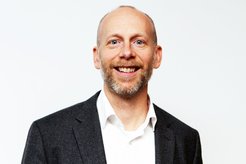Renewed DFG funding for clinician scientists in evolutionary medicine
The German Research Foundation (DFG) is funding the Clinician Scientist Program CSEM at CAU's Faculty of Medicine with another 700,000 euros.

CSEM stands for "Clinician Scientists Program in Evolutionary Medicine". In 2019, the training program started at the Medical Faculty of Christian Albrechts University (CAU) with start-up funding from the German Research Foundation (DFG) for an initial three years. Now the DFG also pledged funding for another two years. The program specifically supports the careers of researching physicians in a structured curriculum and ensures that they have protected time for research - which is otherwise difficult to reconcile with everyday clinical work. "The thematic specialization is unique. Our program is the first in the world in which physicians can specialize in evolutionary medicine during their residency training," emphasizes CSEM head Professor John Baines, who heads the Evolutionary Medicine Section at CAU's Institute of Experimental Medicine and a research group at the Max Planck Institute for Evolutionary Biology, Plön. "The fact that the topic is important is also made clear by the DFG's funding commitment. We are very pleased about this recognition and, of course, about the further funding for our nine Clinician Scientists." The Dean of the Faculty of Medicine, Professor Joachim Thiery, thanked Baines and all involved for their commitment to young scientists in medicine. "This is one of the finest and most important jobs we have! The success of the program encourages us to further expand Evolutionary Medicine in Kiel and to bundle the expertise available here in a larger research project."
Evolutionary Medicine - a topic for the future
Evolutionary Medicine is a young branch of medicine that investigates the evolutionary processes underlying diseases. The goal is also to develop new approaches to therapy and also to the prevention of disease. "Evolutionary biology helps us understand the development of cancer, for example. Basically, cancer is nothing more than the evolution of our own body cells over the course of our lives," explains Baines, who is also a board member in the Precision Medicine in Chronic Inflammation (PMI) cluster of excellence. Another important topic area in evolutionary medicine is the emergence of antibiotic resistance and how to combat it. In addition, there are many other research questions that can be addressed from an evolutionary perspective. For example, Clinician Scientists in CSEM are studying the evolution of gene-microbe interactions in susceptibility to inflammatory skin diseases or the individual differences in susceptibility to obesity. "Nearly half of the projects are in cancer research, and the others are in infectious diseases, inflammatory skin diseases, neurology, energy metabolism and immunology," Baines said. "Evolutionary medicine is opening up promising prospects in these areas. These approaches should be pursued and systematically incorporated into medical education."
Kiel University is particularly well suited as a site for evolutionary medicine clinical research because, together with its partner institutions in the region, it is increasingly becoming a nationwide beacon in evolutionary biology research. For example, CAU was the first university in Germany to create a section for evolutionary medicine. It is also active in various large evolutionary science-oriented research consortia such as the Leibniz ScienceCampus "Evolutionary Medicine of the Lung", the Cluster of Excellence "Precision Medicine in Chronic Inflammation" or the Collaborative Research Center 1182 "Emergence and Functioning of Metaorganisms". Furthermore, the evolutionary perspective is already in the focus of master and doctoral studies in Kiel, among others in the graduate school "International Max Planck Research School for Evolutionary Biology (IMPRS)", which is jointly managed with the Max Planck Institute for Evolutionary Biology in Plön, and the graduate college "Translational Evolutionary Research (TransEvo)", which is funded by the DFG. The Kiel Evolution Center bundles and networks these various activities and actors, for which a new research center is also currently being built.
Combination of structured residency training and clinical research
The CSEM program is one of four programs for physicians interested in research with different topics, which the Medical Faculty of the CAU has established with the Cluster of Excellence PMI and the UKSH. The programs enable structured residency training, ensure clinical and scientific qualification, and at the same time provide freedom for research. "With these programs, University Medicine in Schleswig-Holstein is meeting the enormous demand for physicians who are active in research and clinical practice," emphasizes Medical Dean Thiery. "Corona showed us how efficient, but also how vulnerable and imperfect our medical science and care are. Clinician Scientists are indispensable in this context." A special feature of the Clinician Scientist programs in Schleswig-Holstein is that they were developed in collaboration with the state medical association. The continuing education curricula are officially certified by the Schleswig-Holstein Medical Association. The trainees have planning security. At the end of the program, which lasts up to eight years depending on the specialty, they have sufficient research time, and they have also acquired all the content they need for the respective specialist examination.
About CSEM
The Clinician Scientist Program in Evolutionary Medicine (CSEM) is jointly organized by the Medical Faculty of Kiel University, the University Medical Center Schleswig-Holstein (UKSH), the Max Planck Institute for Evolutionary Biology in Plön (MPI-EB) and the LungenClinic Großhansdorf and is funded by the German Research Foundation (DFG).
The program offers young physicians interested in research the opportunity to pursue an independent, research project in parallel to their clinical qualification as a specialist and lead to habilitation. For this purpose, the clinician scientists are released by the respective clinic for scientific activities as part of their modular curriculum. As part of an accompanying, structured training program, they are given the opportunity to acquire extensive methodological skills and important key qualifications. The aim is to develop sustainable solutions for the major issues in medicine. The focus is, for example, on disease patterns such as inflammatory skin diseases, autoimmune diseases resulting from disturbed bacterial colonization of the body, and various cancers.
Text: Kerstin Nees
